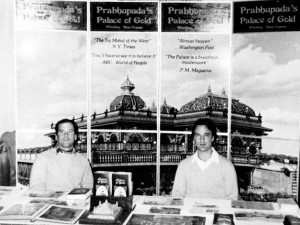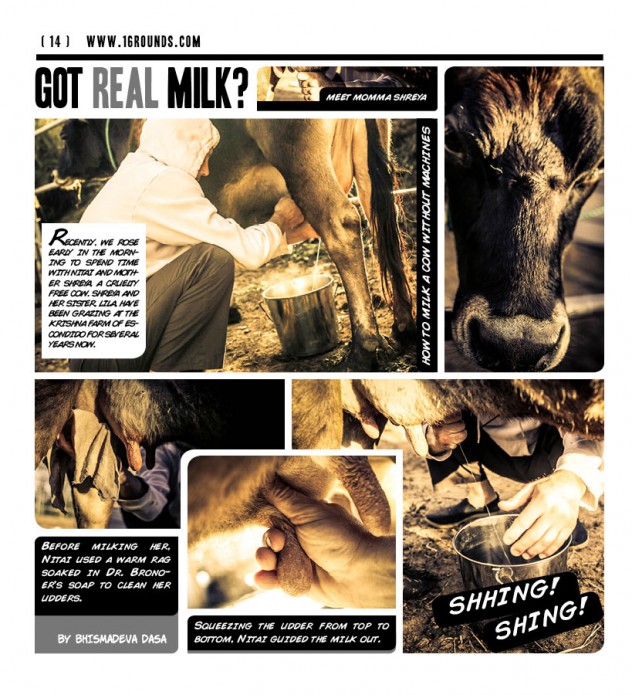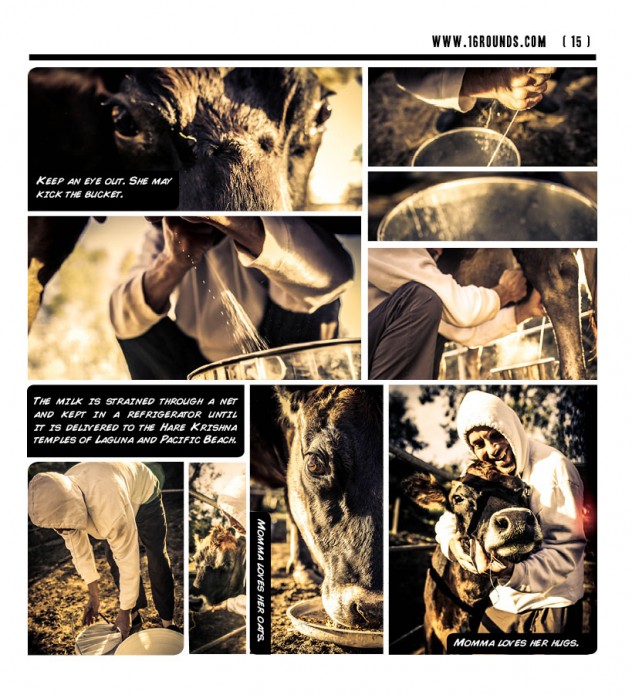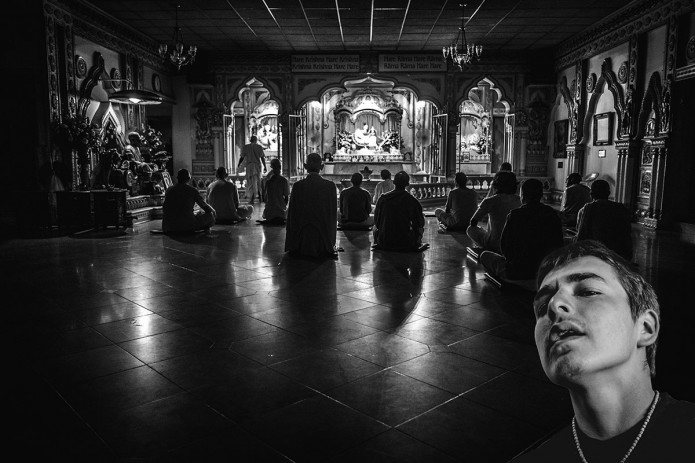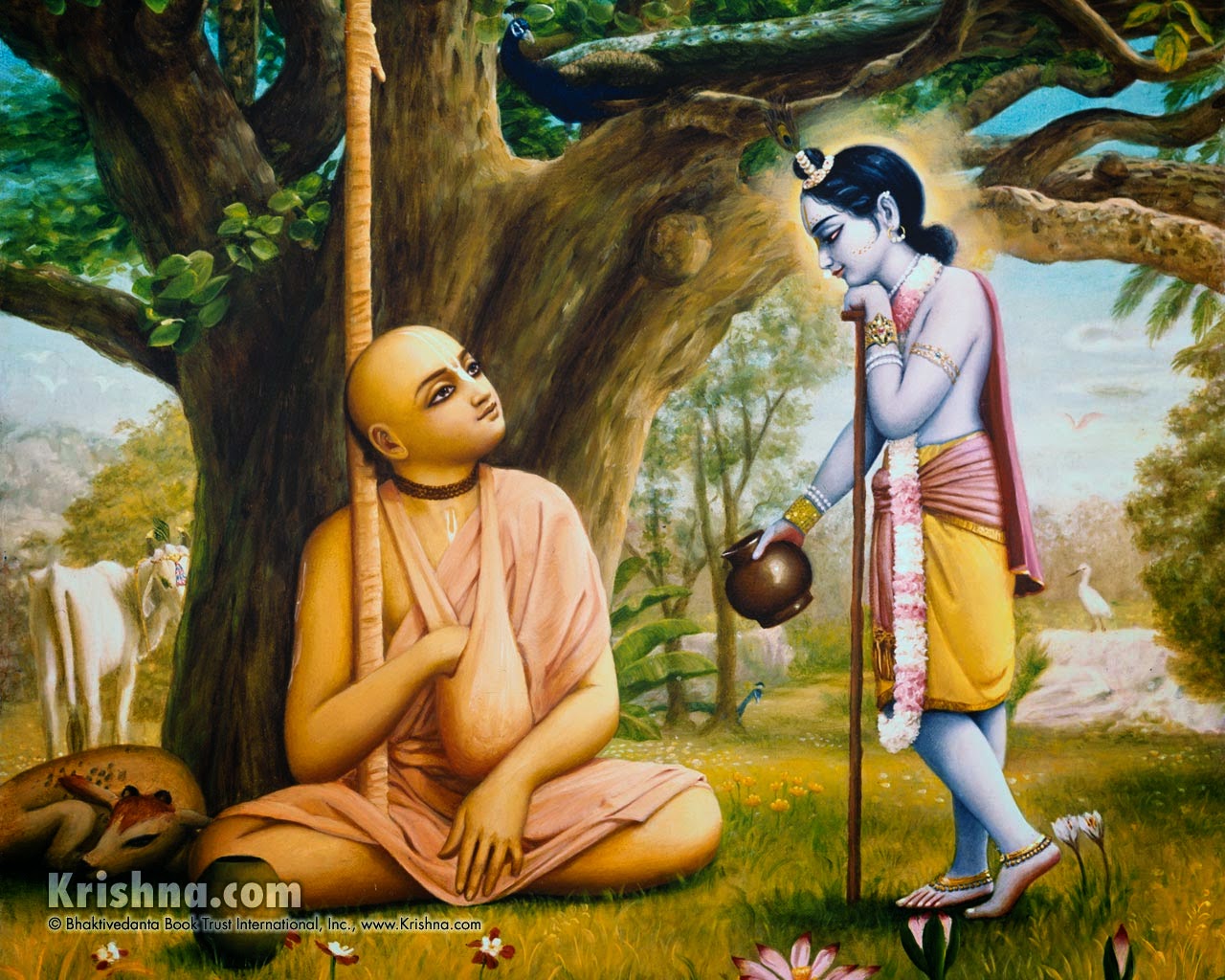Value Education and Spirituality 6 – The Spiritual Foundation of Values 4 – Let secularism protect us from narrow-mindedness, not restrict us in empty-mindedness
Value Education and Spirituality 5 – The Spiritual Foundation of Values 3 – Three non-sectarian arguments for the existence of God
→ The Spiritual Scientist
Value Education and Spirituality 4 – The Spiritual Foundation of Values 2 – Karma shows the sense in life’s seeming senselessness
→ The Spiritual Scientist
Unfulfillment in Devotional Service
→ HH Bhakti Caitanya Swami
Value Education and Spirituality 3 – The Spiritual Foundation of Values 1 – The end is not the end
→ The Spiritual Scientist
Value Education and Spirituality 8 – Mahabharata 2 – Duryodhana – Envy leads to destructive competition that is dissatisfying and degrading
→ The Spiritual Scientist
Prabhupada Letters :: Anthology 2014-05-08 13:05:00 →
Prabhupada Letters :: 1969
Prabhupada Letters :: Anthology 2014-05-08 13:01:00 →
Prabhupada Letters :: 1969
Prabhupada Letters :: Anthology 2014-05-08 12:53:00 →
Prabhupada Letters :: 1969
Prabhupada Letters :: Anthology 2014-05-08 12:50:00 →
Prabhupada Letters :: 1970
Prabhupada Letters :: Anthology 2014-05-08 12:45:00 →
Prabhupada Letters :: 1973
Prabhupada Letters :: Anthology 2014-05-08 12:42:00 →
Prabhupada Letters :: 1973
Prabhupada Letters :: Anthology 2014-05-08 12:40:00 →
Prabhupada Letters :: 1974
Prabhupada Letters :: Anthology 2014-05-08 12:37:00 →
Prabhupada Letters :: 1974
Nagar Sankirtan at Bhatjanla
→ Mayapur.com
There was a Bhakti Vriksha Nagar Sankirtan program at Bhatjala, Krishnagar, organized by Advaita Bhakti Vriksha Gosthi Under Mayapur Local Preaching. Total 16 No. of devotees came from mayapur , including 3 foreign devotees. The Nagar Sankirtan sarts at 5:30 pm for one hour and we came back to stage. There we had Mangalacaran , […]
The post Nagar Sankirtan at Bhatjanla appeared first on Mayapur.com.
Bhakti Vriksha Training Class at Dhubulia
→ Mayapur.com
Recently Bhakti Vriksha Training Class Module-1 completed for 3rd time at Dhubulia for 5 days (22,23,24,29 and 30th April,14) at Sri Binoy Bhushan Saha’s house, who is one of our active Bhakti Vriksha member. There was 15 full time attending candidates from different location namely, Binoy Bhusan Saha and Kalpana Saha (Dhubulia), Shambhu Putatunda and […]
The post Bhakti Vriksha Training Class at Dhubulia appeared first on Mayapur.com.
Lord Caitanya, the One who revealed relationships with Krsna beyond that of servitude (Part 2)
→ SivaramaSwami.com
The post Lord Caitanya, the One who revealed relationships with Krsna beyond that of servitude (Part 2) appeared first on SivaramaSwami.com.
Sita Navami Maha Abhishek : 08-05-2014 (Album 56 photos)
→ Dandavats.com
 ISKCON-Delhi Read more ›
ISKCON-Delhi Read more › Value Education and Spirituality 7 – Mahabharata 1 – Shakuni – Imaginary expectation leads to real destruction
→ The Spiritual Scientist
Sakshi Gopal Prabhu chanting the Holy Name “old school” (4 min video)
→ Dandavats.com
 Parasuram dasa: What tunes did the devotees chant in the old days, well pretty much like this: HG Sakshi Gopal Prabhu leads Kirtan and HG Parividha Prabhu teaches the Maha Mantra to some fortunate souls. Read more ›
Parasuram dasa: What tunes did the devotees chant in the old days, well pretty much like this: HG Sakshi Gopal Prabhu leads Kirtan and HG Parividha Prabhu teaches the Maha Mantra to some fortunate souls. Read more › May 8th, 2014 – Darshan – Chandan Yatra – Day 7
→ Mayapur.com
The post May 8th, 2014 – Darshan – Chandan Yatra – Day 7 appeared first on Mayapur.com.
Greeting Deities & Guru Puja Iskcon London – 27.04.2014
→ Gouranga TV - The Hare Krishna video collection
Greeting Deities & Guru Puja – 27.04.2014
New Vrindaban’s Transcendental Throwback Thursday – 05/08/14
→ New Vrindaban Brijabasi Spirit
New Vrindaban’s Transcendental Throwback Thursday – 05/08/14.
Each week we highlight an earlier era of ISKCON New Vrindaban.
This week’s challenge: Can you identify the two devotees in the photo?
Extra credit: What do you think they are doing?
What to do: Post your guesses on the “who, what, when, where & why” in the comment section at the New Vrindaban Facebook Page.
Technical stuff: We share a photo Thursday and confirm known details Sunday. Let’s keep it light and have a bit of fun!
Special request: If you have a photo showing New Vrindaban devotees in action, share it with us and we’ll use it in a future posting.
Got Real Milk?
→ 16 ROUNDS to Samadhi magazine
Loyalty to Bad Decisions?
→ The Enquirer
 In relation to the implications of Gandhari never objecting to her husbands mistakes and bad decisions…
In relation to the implications of Gandhari never objecting to her husbands mistakes and bad decisions…
I think there is a hierarchy of loyalty. Its not simply loyalty to an isolated person.
For example I would like to be loyal to my Guru, not because he’s a fun person and a nice man who is really smart, but because he has a deep connection to Śrīla Prabhupāda who has a deep connection to the Rupanuga Sampraday from Śrī Caitanya Mahaprabhu, who revealed the śāstra in a groundbreaking, amazing way.
So there is a hierarchy involved. I am loyal to Gurudev because he is loyal to Śrī Caitanya, for example. Now, if Gurudev ceases to be loyal to Śrī Caitanya, he ceases to exist as “gurudev.” My loyalty is primarily in Krishna, Śrī Krishna Caitanya – and consequently in those who properly represent him.
A lot of cult-ism goes on in the name of loyalty — browbeating the masses to embrace stupidity and passiveness as a virtue: “you aren’t qualified to know what Śrī Caitanya Mahaprabhu represents. You are only qualified to know whatever your guru tells you Śrī Caitanya Mahaprabhu represents.”
Although these is an element of truth to this, it is far too often misused as a deceptive tactic, creating a very anti-intellectual and culty environment.
Śrī Gurudev gives me access to the parampara. It is not that Śrī Guru eclipses the previous acaryas and the sastra so that all we can see is him – like Rahu. Rather, Śrī Guru is the lens through which we access the previous acaryas and sastra. Because of Śri Guru I get access to previous acaryas and to sastra itself.
The previous acaryas and the sastra make no effort to be confusing, quite the opposite they tried to make themselves clear. Nor do they make any effort to be hidden or obscure, quite the opposite they tried to make themselves well-known and distributed (that’s why they wrote books). So it is not difficult to read and understand the sastra and previous acaryas when one has the fundamental pointers and context set by the initial instructions of Śrī Guru.
Therefore certain things are quite clear – for example the importance of always striving to engage in Krishna kīrtan. Putting all ones energy there.
So if a disciple sees the guru or see some authority departing from what has been shown clearly by previous acaryas and by sastra – it is in the disciples right to say, “whoa.” and to try to help the guru return to the proper situation. And if the guru refuses after many attempts, the disciple shouldn’t hate the person, but neither should he continue to follow subsequent instructions and guidance from the person.
I have a favorite quote from Aindra Prabhu, “Being humble is one thing, being stupid is another.”
Spiritual Hunger
→ 16 ROUNDS to Samadhi magazine
Every person is hungry for spiritual happiness and therefore many people are not satisfied. They are trying to gratify their senses in so many ways, but still they are not satisfied; they remain “hungry.” Just like when the child is crying. Its mother may be offering something, but the child is still crying. That means that the child is asking for something which the mother cannot understand. Similarly, the dissatisfaction of the world means that people are actually hankering for spiritual happiness. Every person is hungry for spiritual happiness. They are trying to gratify their senses in so many ways, but still they are not satisfied, because actually they are hungry. This type of happiness is seldom offered, and when it is offered, many do not understand it and do not take to it. This is the situation.
Brahma Muhurta
→ 16 ROUNDS to Samadhi magazine
Wake Up to a Spiritual Awakening
The time early in the morning, one and a half hours before sunrise, is called Brahma-Muhurta (Hour of God). It is recommended that one rise from bed at that time and take to spiritual activities by performing meditation and chanting sacred mantras. This period is very convenient for the execution of all spiritual activities. Any spiritual activity performed early in the morning has a greater effect than in any other part of the day.
Here are a few reasons to set the alarm clock to wake us up early.
Get Spiritual Goals into Focus – Go Deeper!
Waking up early can help bring higher life goals immediately into focus for the whole day. It is the most effective way to get serious about our spiritual evolution. It is understood by the yogis that the mind is a repository of different impressions and memories, known in Sanskrit as samskaras. These impressions within our mind give rise to our various desires. As we all know, desire is the main driving force behind all action. After waking up early and bathing, one can immediately begin to chant sacred mantras, such as chanting the Hare Krishna Maha Mantra, and start the process of re-spiritualizing the mind.
Brahma Muhurta is the perfect time to meditate because the passionate flow of city life has not yet begun. Nothing is stirring at this time and things are in a state of positive, high potential as the sun rises. As the sun begins its journey overhead, it tends to shift our mental energy to a more externally oriented working state, in which it becomes harder to concentrate more internally, more deeply.
One can also learn a few notable Sanskrit prayers and recite them at this time as part of a routine to build up more of the good spiritual impressions, which will ultimately help the mind to focus on higher aspirations.
Get Your Lifestyle into Balance – Get Shakti!
There is something to be said about the harmony and balance we can feel when aligning our sleep cycle with the natural patterns and movements of nature. “Early to bed, early to rise, makes a person healthy and wise” is an old adage in reference to this point. Far too often, in chasing our passions, we slip into a highly unregulated lifestyle, in which we sleep at random times, eat at random times, and so on. This is not at all healthy for the body, as our physical system is at its optimum when there is continual regulation. Having a set schedule in general is not only good for the functioning of bodily rhythm, but good for the mind as well. The mind will know when it is time to flow into different activities, thus ultimately helping us become more productive.
Srila Prabhupada, a great spiritual master in bhakti-yoga said, ”If a person rises everyday during the brahma muhurta for twelve years and chants the Hare Krishna maha-mantra, then everything that person does and says will be perfect.” Thus, to sleep and wake at a designated time also trains the mind in self-control, which builds our will power and can give us a special power of perception to be more in tune with the energies of life and their higher source.
Universal Influences – Align with Cosmic forces!
One metaphysical aspect that yogis have taught for thousands of years is that our environment influences our behavior in subtle ways according to the quality of people, places, foods, and times of day we most associate with. In the Vedic stories it is stated that those who are inclined to a demoniac nature, or the “dark side,” feed off the energy of night. Consequently many crimes are committed in the dead of night, and the night is often associated with drunkenness, loneliness, etc., whereas the morning environment is more notably a time of peace and serenity. It is understood that the qualities of the morning environment can actually influence similar characteristics within our mind and behavior.
While living in the ashrama in Pacific Beach, a San Diego college town, together with monks and residents there, I would rise early to do chanting and meditation. During this time I would hear people wandering the streets, making their way home after a long night of indulgence and revelry. Yet, to us, our world of consciousness was just beginning. In this experience I would see first hand how the various environments and times of day activated various mental states of passion, ignorance, or goodness.
In summary, imagine spending your whole life staying up late and sleeping in late. You may never experience an entirely different spectrum of life on Earth, namely the godly hours of the morning. Thus, it is said in the Bhagavad Gita, “What is night for the spiritually awake, is day for the materialistic person. And what is night for the materialistic person is day for the spiritually awake.”
If you would like to start fresh and add more momentum to your sadhana or spiritual practice, then observing the Brahma Muhurta is definitely worth experiencing.
Clinically Dead Baby Revived by Mother’s Touch
→ ISKCON News
Use Beets as a Detoxifying, Brain Boosting Side Dish
→ ISKCON News
Did the Pandavas actually complete the full year of ajnata vasa or were they detected before time?
→ The Spiritual Scientist
Kunti’s Prayers 5 – (1.8.35-37) – Don’t deny human emotions in the name of transcendence
→ The Spiritual Scientist
Helpful Tips for Building Your Own Herb Garden
→ ISKCON News
When Ashwatthama’s Brahmastra is charging towards Arjuna how does he get time to do achmana and offer prayers to Krishna before countering it?
→ The Spiritual Scientist
The abhidha and lakshana potencies of sound
→ The Spiritual Scientist
By arrangement of sound is created a composition. The potency by which the meaning of sound is grasped is called the abhidha potency of the sound or the connotative power of the sound. By using the word "ten" with "elephants" we can understand a certain number of elephants. This direct meaning is called abhidheya. There is another potency of words called "laksana". In the phrase "cowherds on the Ganga," since cowherds cannot stand on the surface of the Ganga's water, by the laksana sakti we understand that the cowherds are on the bank of the Ganga. Where it is necessary to use the laksana sakti, the abhidha sakti does not operate. Where the direct meaning can be used, only the abhidha sakti functions.
Chaitanya Shikshamrita, Bhaktivinoda Thakura
Kirtan Shakti – The Album
→ ISKCON News
Worthy Of My Worship
→ Japa Group
TRANSLATION
Arjuna said: O killer of enemies, O killer of Madhu, how can I counterattack with arrows in battle men like Bhīṣma and Droṇa, who are worthy of my worship?
PURPORT
Respectable superiors like Bhīṣma the grandfather and Droṇācārya the teacher are always worshipable. Even if they attack, they should not be counterattacked. It is general etiquette that superiors are not to be offered even a verbal fight. Even if they are sometimes harsh in behavior, they should not be harshly treated. Then, how is it possible for Arjuna to counterattack them? Would Kṛṣṇa ever attack His own grandfather, Ugrasena, or His teacher, Sāndīpani Muni? These were some of the arguments offered by Arjuna to Kṛṣṇa.
Bhagavad-gītā As It Is 2.4
I Pray For That Success
→ Japa Group
From Bhajan Kutir #77
by Satsvarupa dasa Goswami
Appearance of Lord Nrsimhadeva Festival Tues. May 13, 2014
→ New Vrindaban Brijabasi Spirit
Evening (exact schedule to be announced)
Special Note:
Some of our distinguished presenters mentioned below, from the Festival of Inspiration will be staying on and giving some classes for our annual Nrsimhadev Appearance Festival.
Stay tuned!
Yadunandana Swami
Bhakti Vasudev Swami
Hari Sauri Dasa
Srutakirti Dasa (tentative)
Kirtan Shakti Album to Support Underprivileged Girls in Vrindavana
→ ISKCON News
Personal service
→ KKSBlog
(Kadamba Kanana Swami, 31 March 2014, Cape Town, South Africa, Srimad Bhagavatam 9.5.1)
Personal service is valuable. In the seventh canto, the position of the spiritual master is described. It is mentioned that one must become a menial servant of the spiritual master, render personal service and see that all his personal needs are supplied. And why is that… because it is difficult! In the course of personal service, so many things are required. It has to be particular because each person is particular.
One may himself be a person who likes lots of fresh air but may serve someone who doesn’t; who is different and may like all the windows closed. So, one has to gradually give up his own idea of serving and not serve according to his own standards of what is best; one must gradually learn what are the standards that are best by the person that he is serving. That is quite an adjustment and in that adjustment, one must grow.
This personal service element is mentioned as valuable. Looking after the personal comforts and these things are good and well, but how much personal comfort can a person digest. Sometimes, it is difficult to be the object of so much service. Sometimes, part of the service is to stop serving; that would be a great service because all this service can become too much. So that is also there! One has to know when to and when not to serve.
But more important than personal service is that one takes up the work of the spiritual master… that is most dear to the spiritual master! That work is to somehow or other, spread Krsna consciousness to all the conditioned souls in this world, in various ways. That is most needed and desired. Anyone who takes up that work, he is priyah-krttamah (Bhagavad-gita 18.69), most dear as Krsna says because that is Krsna’s work. That is ultimately real service.
